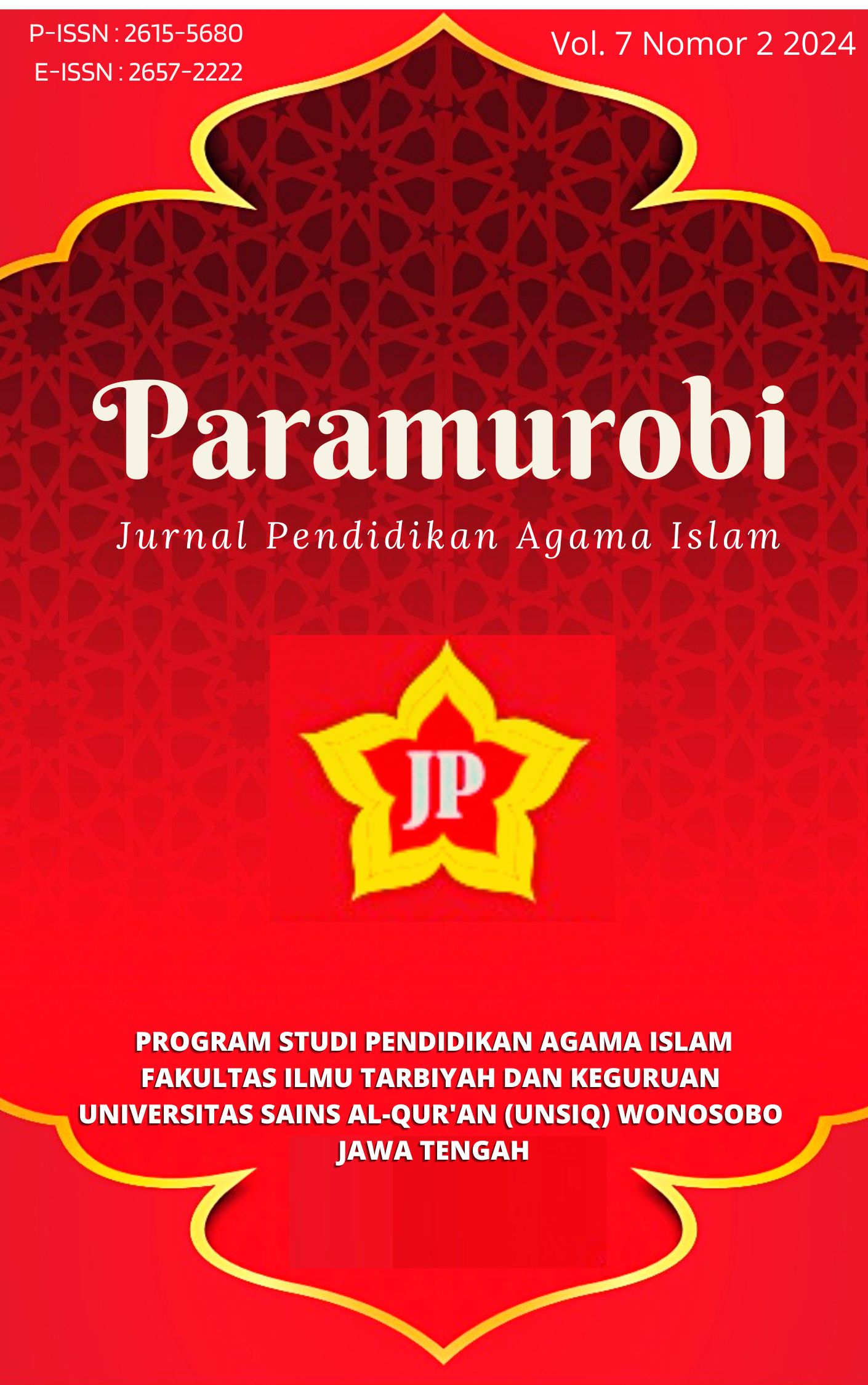URGENSI PENDIDIKAN PROFETIK PADA ERA MILENIAL DALAM MENANGKAL FAHAM RADIKALISME DI PERGURUAN TINGGI ISLAM
DOI:
https://doi.org/10.32699/paramurobi.v7i2.8138Keywords:
Propethic Education, Radicalism, Higher Education and Millenial EraAbstract
This study aiming to expose about development movement radicalism among student in the modern era when entering the millennial era. This research is study qualitative with use method analysis document in various the source in the form of information from journals, book and actual news. In general line big results study show that; First, doctrine radical in the millennial era happen because socializing between fellow student and influence information from social media especially easy internet accessed and studied on sites that teach about views Islamic fundamentalists. Second in a way factual lots exposed students by understand radical originate from various campus college tall in a way easy infiltrated by influence movement fundamentalist or revivalist. Third, prophetic education is one alternative that can taught with carry out the learning process and introduce values of prophetic education that puts forward values humanity, tolerance, and moderation religion, diversity, and accommodation on every difference understand good that comes within the Muslim community as well as from abroad from people outside of Islam.
References
BIN Ungkap 39 % Mahasiswa Terpapar Radikalisme, CNN Indonesia, https://www.cnnindonesia.com/nasional/20180429023027-20-294442/bin-ungkap-39-persen-mahasiswa- terpapar-radikalisme
BNPT: Tahun 2024 Posisi Indonesia dalam GTI Masuk Kategori Negara Low Impact By Terrorism, https://www.bnpt.go.id/bnpt-tahun-2024-posisi-indonesia-dalam-gti-masuk-kategori-negara-low-impacted-by-terrorism
Dijk, C. Van, (1981), Rebellion Under the Banner of Islam: The Darul Islam in Indonesia, Martinus Nijhoff.
Moh. Masduki, Pendidikan Profetik: Nilai Pesan dan Gagasan Kuntowioyo, INSURI Ponorogo, 15 Juli 2019.
Nata, Abuddin, “Pendidikan Islam Era Milenial”, dalam Concienca, Hasil Penelitian, Tp. Tt.
Novala, Muhammad Fajar, Dewi Aprilia, Nilai-Nilai Profetik Dalam Teks Cerpen Pada Buku Ajar Bahasa Indonesia, (Solo: UNS, 2021)
Jalwis, Sosialisasi Menangkal Radikalisme di Kalangan Mahasiswa, dalam Jurnal Altifani, Jurnal Pengabdian Masyarakat, Fakultas Ushuludin Adab dan Dakwah, Volume 1 No. 1 Tahun 2021. https://scholar.google.com/citations?view_op=view_citation&hl=en&user=VObFuDUAAAAJ&citation_for_view=VObFuDUAAAAJ:mB3voiENLucC
Kuntowijoyo, (2004), Islam Sebagai Ilmu Epistemologi, Metodologi, dan Etika, Jakarta: Mizan Publika.
Kompas. Com, BNPT: Aksi Terorisme Turun, tapi Paham Radikal Perempuan, Anak dan Remaja Meningkat. https://nasional.kompas.com/read/2024/02/20/18074461/bnpt-aksi-terorisme-turun-tapi-paham-radikal-yang-targetkan-perempuan-anak
Kompas TV, “ BNPT: 33 Juta Penduduk Indonesia Terpapar Radikalisme, Butuh Undang-Undang Pencegahan. Kompas TV, 21 Juli 2022. https://www.kompas.tv/nasional/311315/bnpt-33-juta-penduduk-indonesia-terpapar-radikalisme-butuh-undang-undang-pencegahan
Saidi, Anas, (2017) Radikalisme Di Kalangan Mahasiswa Sudah Menghkhawatirkan, :LIPI lipi.go.id. Lembaga Ilmu Pengetahuan Indonesia (Indonesian Institute of Science)
Sani, M. Abdul Halim, (2011), Manifesto Gerakan Intelektual Profetik, Yogyakarta: Samudra Biru.
Soetapa, Djaka, (2006), Seri Seminar Masa Depan Bangsa dan Radikalisme Agama, Bandung: Gunung Jati Press
Tempo.co, “Kepala BNPT Mengaku Punya Data Kampus dan Mahasiswa Terpapar Radikalisme” 25 Mei 2022. https://nasional.tempo.co/read/1594894/kepala-bnpt-mengaku-punya-data-kampus-dan-mahasiswa-terpapar-radikalisme
Downloads
Published
Issue
Section
License
Copyright Notice
1. Authors retain copyright and grant the journal right of first publication with the work simultaneously licensed under a Creative Commons Attribution License (CC BY-SA 4.0) that allows others to share (copy and redistribute the material in any medium or format), and adapt (remix, transform, and build upon the material) the work for any purpose, even commercially with an acknowledgement of the work's authorship and initial publication in this journal.
2. Authors are able to enter into separate, additional contractual arrangements for the non-exclusive distribution of the journal's published version of the work (e.g., post it to an institutional repository or publish it in a book), with an acknowledgement of its initial publication in this journal.
3. Authors are permitted and encouraged to post their work online (e.g., in institutional repositories or on their website) prior to and during the submission process, as it can lead to productive exchanges, as well as earlier and greater citation of published work (See The Effect of Open Access).





